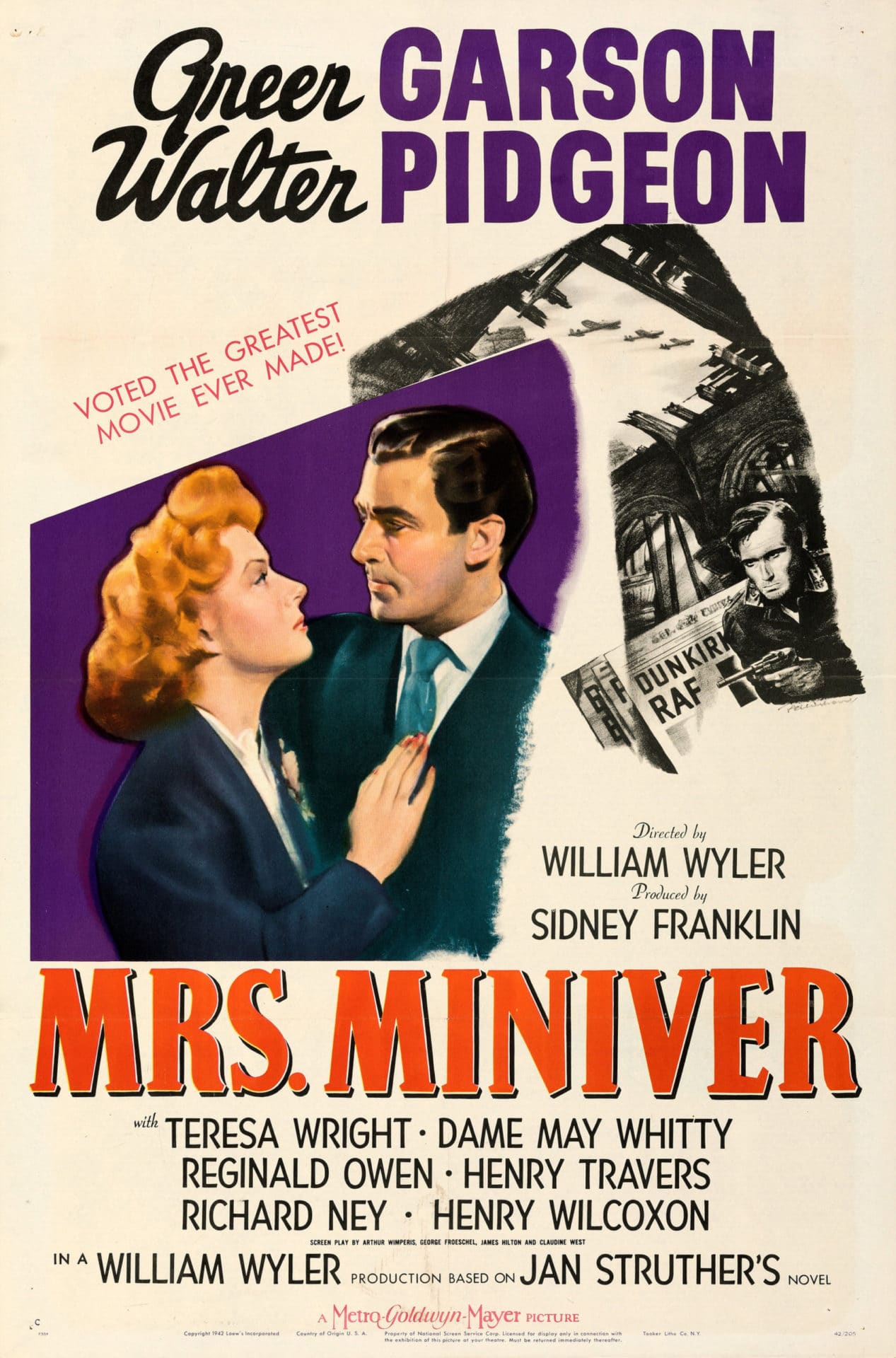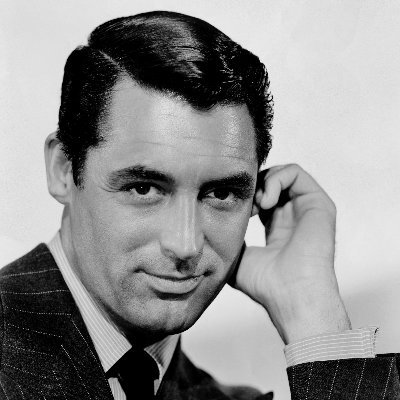
- Starring
- Greer Garson, Walter Pidgeon, Teresa Wright
- Writers
- Arthur Wimperis, George Froeschel, James Hilton, Claudine West
- Director
- William Wyler
- Rating
- G (Canada, United States)
- Running Time
- 134 minutes
Overall Score
Rating Summary
Mrs. Miniver is a film that would only have worked during the time it was produced. Fascination with England and British culture in general was at a high never before seen or experienced up to that point, we were all thrown into the roes of World War II, and there was clamoring for resistance against Adolf Hitler and his Nazi movement. In much of the Transatlantic, and especially in Hollywood, there was the idea to put a sentimental spin on the matters, simplifying the events as much as possible to boil it down to, “Rah rah patriotic spirit America good, kill the bad Germans!”, rather than teaching people about the hard truths and nuances of how a hateful ideology could poison an ordinary person’s brain with enough conditioning.
In several propaganda films, viewers saw pristine lilywhite towns full of impossibly perfect people, and the Nazis were usually portrayed as evil fodder to be defeated by patriotic American soldiers, and little more. Of course, those who know the history from this time period will understand why this was such, but it doesn’t really make it any much easier to stomach, especially when our collective viewpoints became considerably more nuanced even just a few years later. It’s really equivalent to saying “Oh, those were different times!” when we ought to be understanding the past better so we can work to create a better future.
This preamble is important because Mrs. Miniver is a perfect encapsulation of the jingoism that rang through the Transatlantic back in the early 1940s. It shows us ordinary British housewife Kay Miniver (Garson), and how she inspires the people around her as she struggles to navigate with her family through World War II. There are problems from the outset: if Kay is just an ordinary housewife, why is she and her family seemingly so affluent and admired? This is the same issue as an earlier Best Picture winner Cavalcade, in which it is difficult to really care about the characters because their status ensures there’s very little stakes involved. That’s a problem when your movie is centered around the conflict and effects of World War II on regular people! Of course, there is the potential to take the wealthy family down a peg, they could’ve lost their fortune in the ravages, but because it’s a World War II propaganda movie, it never considers to go down a route as challenging as that. There’s also the heavy-handed Christian allegories made throughout the film that just can’t help but be cringeworthy when viewed in a modern context.
Garson was one of the biggest stars of the 1940s, playing a litany of polite, uptight, morally flawless British ladies. It’s kind of puzzling to fathom her stardom in a modern-day context, given that she’s largely forgotten outside of film circles, but there is a reason Mrs. Miniver is her signature role. Even despite the blank slate nature of the character itself (a trait in many of Garson’s other characters), she is such a nice, uncompromisingly pleasant person, devoted to improving the lives of those around her. Despite the issues with the writing of her character, you can definitely see why someone would want to be her friend. She also backs up her innate kindness with a steely reserve. She’s somewhat anonymous yet unmistakable at once. The other characters around her on the other hand are kind of hit-and-miss. Kay’s husband Clem (Pidgeon) is a disappointingly limited presence, the most he has being some touching moments with his wife (and flirting in that perfectly tasteful, 1940s adult manner).
There is a subplot about the Miniver son Vin (Richard Ney), his increasing idealism, his enlistment in the Royal Navy, and his blossoming romance with Carol Beldon (Wright), granddaughter of Lady Beldon (Dame May Whitty). This subplot should’ve informed for more conflict, requiring Mrs. Miniver to come to difficult conclusions about letting her son go, accepting his newfound love, but the latter is more something Lady Beldon is given to do. Whitty does her usual crusty old upper-class lady routine, but she does get a moving heart-to-heart with Mrs. Miniver about marrying too young. Carol feels less like a character than she does like sentient symbolism in service of this movie, a distressing waste of the talented and underrated Wright. Then there’s the village flower show subplot that genuinely feels like padding to stretch out the movie’s runtime (can you tell by now that Goodbye Mr. Chips author James Hilton was one of four screenwriters for this movie’s script?) and Mr. Ballard (Henry Travers), just like that entire subplot, feels like an afterthought, making it impossible to care about his eventual death.
The one scene that stuck out was when Mrs. Miniver confronts a German pilot hiding in her garden. He takes her at gunpoint, demands food and a coat, and declares the Third Reich will eviscerate its enemies. This could’ve been a moment where he is touched by Mrs. Miniver’s unconditional kindness, maybe had a change of heart, and viewers could’ve understood the capacity to which the Nazi movement really was a cult among many things. It would’ve been cliched, but it would’ve fit within this movie and left the audience a moment for genuine contemplation. Instead, Mrs. Miniver just punches him for a hollow “Hell yeah! Our protagonist is a boss!” moment. Again, it’s understandable why this choice was made, but it doesn’t make the missed opportunity feel any less missed.
With all that said, it’s far from terribly made. Joseph Ruttenberg’s cinematography is glowingly natural and adds a foreboding mood to the scenes of war, as well as making the Minivers’ house ‘Starling’ look glistening and gorgeous. Wyler has such a steady directorial hand that it’s easy to take him for granted, but he always puts in good effort even with weak material. Every other aspect of the production is top-notch, from the score to the sound work to the editing. One would almost think it wasn’t a glorified propaganda film.
As it stands, Mrs. Miniver is an interesting artifact for its time, especially if you want to know America and England’s reaction to war in the 1940s, but there’s not much appeal for a modern audience that presumably has a more rounded understanding of the nuances of war.
still courtesy of MGM
Follow me on Twitter, Instagram, and Letterboxd.
If you liked this, please read our other reviews here and don’t forget to follow us on Twitter or Instagram or like us on Facebook.
Discover more from
Subscribe to get the latest posts sent to your email.

